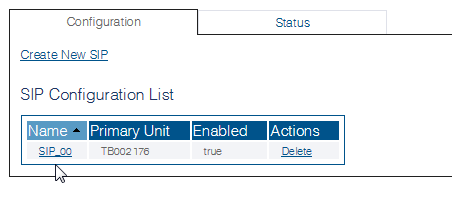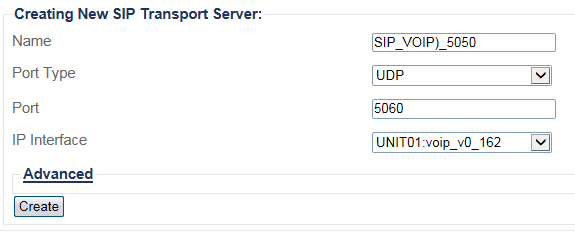Toolpack:Creating a SIP Transport Server D
From TBwiki
(Difference between revisions)
m (rev change) |
|||
| (6 intermediate revisions by 2 users not shown) | |||
| Line 1: | Line 1: | ||
| − | |||
{{DISPLAYTITLE:Creating a SIP Transport Server}} | {{DISPLAYTITLE:Creating a SIP Transport Server}} | ||
| + | {| class="wikitable" | ||
| + | |- | ||
| + | |rowspan="3"|This article applies to: | ||
| + | |'''Product''' | ||
| + | |'''Version''' | ||
| + | |- | ||
| + | |Tmedia | ||
| + | |2.9, 2.10, 3.0, 3.2 | ||
| + | |} | ||
| + | |||
After you create a SIP stack, you must must create a new SIP transport server for your SIP configuration. | After you create a SIP stack, you must must create a new SIP transport server for your SIP configuration. | ||
| Line 30: | Line 39: | ||
* Click '''Create''' | * Click '''Create''' | ||
| − | [[Image: | + | [[Image:SipTransport_2a.png]] |
| Line 46: | Line 55: | ||
'''Path''' | '''Path''' | ||
<pre> | <pre> | ||
| + | /configurations/@[configuration_name]/sip_stacks/@[sipStack_Name]/transport_servers/@[sipTransportServer_name] | ||
</pre> | </pre> | ||
| Line 69: | Line 79: | ||
</pre> | </pre> | ||
</div> | </div> | ||
| − | |||
==List of Parameters== | ==List of Parameters== | ||
Latest revision as of 13:29, 25 November 2020
| This article applies to: | Product | Version |
| Tmedia | 2.9, 2.10, 3.0, 3.2 |
After you create a SIP stack, you must must create a new SIP transport server for your SIP configuration.
Note: In order to employ SIP transport servers, the protocol that they will use to transport the SIP signaling traffic must be defined.
To do so:
1- Click SIP in the navigation panel
2- Select a SIP stack for which you wish to create a transport server
3- Click Create New Transport Server
4- Create the new SIP transport server:
- Enter a name for the server
- Select an appropriate port type
- Select an appropriate IP interface
- Click Create
5- Verify that the "SIP transport server was successfully created" message appears, and that the new server is listed in the Transport Servers list
Path
/configurations/@[configuration_name]/sip_stacks/@[sipStack_Name]/transport_servers/@[sipTransportServer_name]
Parameters (text)
/configurations/@[configuration_name]/sip_stacks/@[sipStack_Name]/transport_servers/@[sipTransportServer_name] ip_header_tos = 0 ip_interface = "@[hardware_name].@[voip_Name]" name = "@[sipStack_Name]" port = 5060 port_type = "UDP"
Parameters (json)
{
"ip_header_tos" : 0,
"ip_interface" : "@[hardware_name].@[voip_Name]",
"name" : "@[sipStack_Name]",
"port" : 5060,
"port_type" : "UDP"
}




